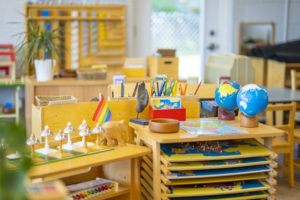Selecting the right early childhood education program is a pivotal decision for parents with all available options. Here, we’ll explore why it holds a special place in our hearts, standing out compared to play-based programs. We’ll look through individualized learning, practical life skills, the significance of order and structure, the cultivation of executive functioning skills, and the enduring benefits that paint a vivid picture of the Montessori advantage.
Individualized Learning:
One of the hallmarks of Montessori education that we hold dear is our unwavering commitment to individualized learning. Within our classrooms, children are not just students but unique individuals with distinct needs. Here, we encourage them to explore self-discovery, providing materials tailored to their learning styles. The beauty of this approach lies in fostering a solid foundation in critical subjects like math, language, and science. The American Montessori Society echoes our sentiment, emphasizing how individualized learning enhances a child’s self-directed learning and cognitive development.
Focus on Practical Life Skills:
In our Montessori world, practical life skills take center stage. We believe in teaching children fundamental tasks such as cooking, cleaning, and self-care through hands-on activities. These skills are more than just chores; they’re building blocks for independence and self-sufficiency. It’s a focus that sets us apart, recognizing the importance of nurturing the whole child. The Journal of Montessori Research beautifully articulates the impact of emphasizing practical life skills on a child’s holistic development.

Emphasis on Order and Structure:
In our Montessori classrooms, you’ll find deliberate order and structure. Every routine and every procedure is thoughtfully designed to foster self-discipline and self-control. It’s more than just an organized space; it’s a canvas for secure and confident learning. The National Center for Montessori in the Public Sector echoes our belief, underscoring the positive impact of order and structure on children’s behavior and sense of security.
Development of Executive Functioning Skills:
Our Montessori programs are crafted to be a playground for cultivating executive functioning skills. From attention to planning and problem-solving, our materials are carefully chosen to challenge young minds. It’s a cognitive journey that goes beyond textbooks and worksheets. The Journal of Educational Psychology reinforces our approach, highlighting the positive impact of Montessori education on children’s executive functioning skills development.
Long-Term Benefits:
Here at Western Height Montessori Academy, we love witnessing the lasting impact of Montessori education on our little learners. Research consistently shows that children who walk through our Montessori doors emerge with better academic outcomes, higher self-esteem, and superior social-emotional development. It’s not just about the grades; it’s about instilling a love for learning that resonates throughout their lives. A longitudinal study published in the Journal of Research in Childhood Education is a testament to the enduring benefits of Montessori education on children’s academic and socio-emotional development.
Montessori stands tall in the vast landscape of early childhood education, offering a distinctive choice imbued with warmth and wisdom. From the intimate dance of individualized learning to the practical symphony of life skills, the harmonious order and structure, the artistic cultivation of executive functioning skills, and the timeless melody of enduring benefits, Montessori paints a comprehensive and personal portrait of success in school and life.
